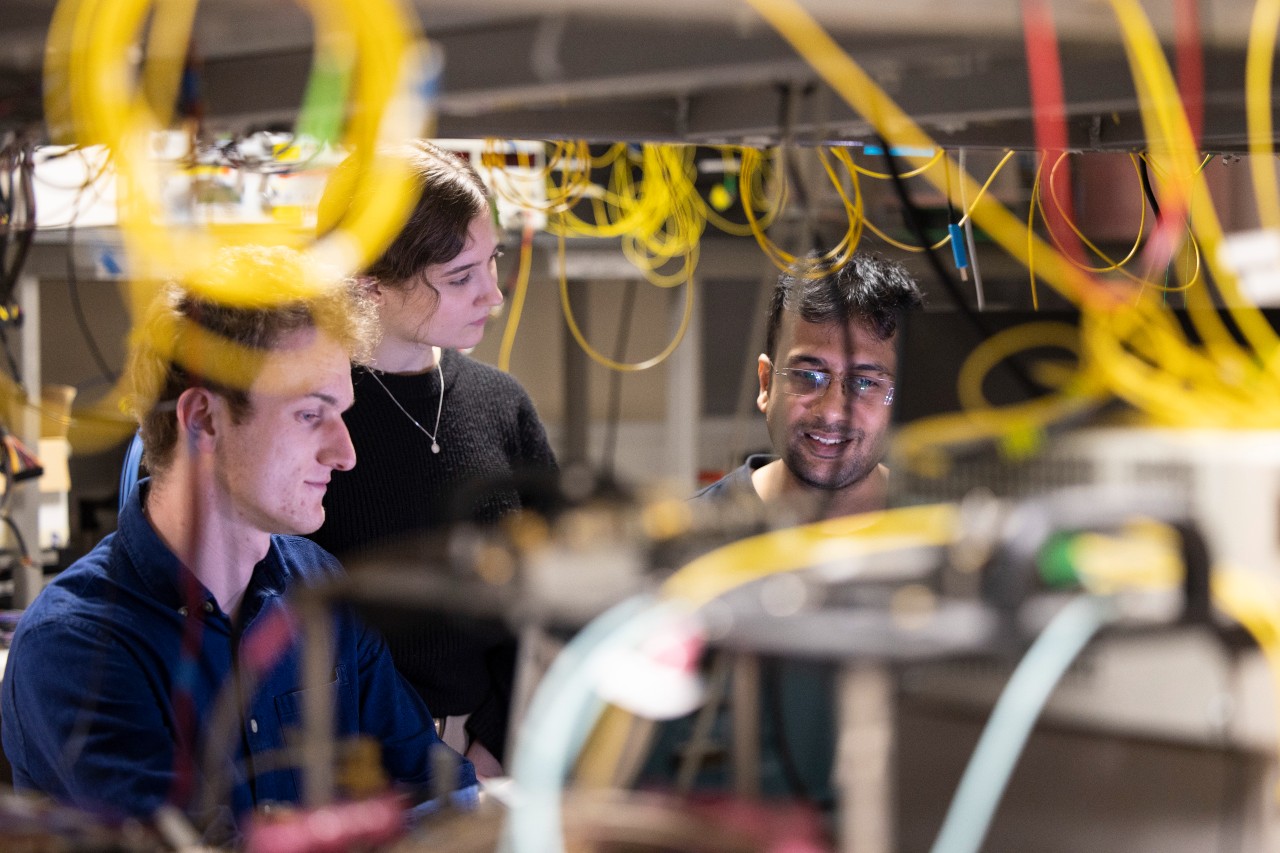
Tyndall’s Optical Communications research programme has established a new Irish capability in advanced photonic communication systems research at University College Cork (UCC) and Tyndall. The team develops next-generation optical communications and related technologies, with higher speed, capacity or scalability, and lower energy consumption, to enable future communication services and continued growth and evolution of the global Internet.
Our mission is to develop technology, from circuits to systems, that pushes the frontiers of optical signal generation and recovery, and develop new concepts for future networks. The team focuses particularly on finding new ways of integrating different photonic and electronic technologies to demonstrate greatly enhanced capabilities (e.g. higher speed, capacity or scalability) of optical communications and other applications, with the primary aim of reducing the overall cost and energy consumption of future full-scale systems.
Research Challenge
Optical fibre systems underpin the global communication infrastructures that human, social and economic fabrics are critically dependent on today. The existential impact of these technologies was graphically illustrated during the recent Covid pandemic when the need for new modes of virtual interaction and remote working on a global scale became imperative almost overnight.
To enable the continued evolution and growth of these critical technologies, our researchers are developing semiconductor integration and packaging innovations, advanced system prototypes and concepts, and testbeds for the communication systems of the future.
For example, the anticipated future digital transformation will see the widespread adoption of artificial intelligence (AI) in Data Centres, which will require a paradigm shift in low-energy, high-throughput, zero-loss interconnects, which Tyndall is addressing through the development of new optoelectronics and packaging technologies.
The optical network as a sensor is another area of focus. Here, our researchers are developing systems that can utilise an underwater optical fibre cable as an array of acoustic sensors to monitor and ensure the safe and secure operation of offshore wind farms, for example, which are critical elements of future national sustainable energy supply infrastructure.

Technology Solutions
Recent examples include: technologies for new communication bands at 2-micron wavelengths, new impairment-tolerant wireless modulation formats based on a technique known as orthogonal chirp division multiplexing invented by the group, and new long-reach broadband optical access networks that enable the elimination of approximately 95% of the electronic switching centres in a typical national network, leading to significant cost and energy savings.
The Photonics Systems team collaborates widely with photonic materials, component and integration specialists in the 200-person Tyndall Institute and the SFI Irish Photonics Integration Centre (IPIC) photonics research ecosystem, as well as with industry, to ensure our innovations generate real-world impact. The team is also highly active in European research programmes, participating in 18 projects worth €14.5 million to Ireland since 2006 (including Irish industry, whose participation the group has enabled). The latest EU project, ADOPTION, which is coordinated by the Photonic Systems team, is developing ultra-high-capacity, energy-efficient, co-packaged optical interconnect solutions for future data centres.
Recent Publications
Muthuganesan, E. Mura, S. Chugh, C. Antony, E. Pelucchi, P. Townsend, X. Yan, M. Banakar, Y. Tran, C. Littlejohns, B. Corbett, “100 Gbps PAM4 ultra-thin photodetectors integrated on SOI platform by micro transfer printing“, Optics Express, 31 (22), 36273-36280, (2023).
Recent Projects
Adoption
Project ADOPTION will demonstrate disruptive new network architectures for hyper-scale data centres and AI computing clusters utilising optical switching and routing to increase efficiency and reduce latency. ADOPTION aims to create a new ecosystem of research and innovation, building on the complementary expertise of three SMEs, three large companies and four research institutions in the consortium, and to redefine the digital supply chain for CPO transceivers, fostering European competitiveness in this new value chain.
Phormic
Project PHORMIC establishes a European platform for next-generation programmable photonic chips with a low adoption threshold for product developers in diverse application domains.
